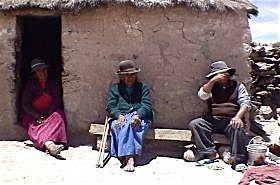Backs To The Future
New analysis of the language and gesture of
South America's indigenous Aymara people indicates they have a concept of time
opposite to all the world's studied cultures -- so that the past is ahead of
them and the future behind.

The speaker, at right, indicates next year by pointing backwards over his left shoulder.
Tell an old Aymara speaker to “face the past!” and you just might get a blank stare in return – because he or she already does.
New analysis of the language and gesture of South America’s indigenous Aymara people indicates a reverse concept of time.
Contrary to what had been thought a cognitive universal among humans – a spatial metaphor for chronology, based partly on our bodies’ orientation and locomotion, that places the future ahead of oneself and the past behind – the Amerindian group locates this imaginary abstraction the other way around: with the past ahead and the future behind.
Analysis of the gestural data proved telling: The Aymara, especially the elderly who didn’t command a grammatically correct Spanish, indicated space behind themselves when speaking of the future – by thumbing or waving over their shoulders – and indicated space in front of themselves when speaking of the past – by sweeping forward with their hands and arms, close to their bodies for now or the near past and farther out, to the full extent of the arm, for ancient times. In other words, they used gestures identical to the familiar ones – only exactly in reverse.
“These findings suggest that cognition of such everyday abstractions as time is at least partly a cultural phenomenon.”
[The] Aymara counter-example makes plain that there is room for cultural variation. With the same bodies – the same neuroanatomy, neurotransmitters and all – here we have a basic concept that is utterly different,” he said.
Why, however, is not entirely certain. One possibility, Nunez and Sweetser argue, is that the Aymara place a great deal of significance on whether an event or action has been seen or not seen by the speaker.
A “simple” unqualified statement like “In 1492, Columbus sailed the ocean blue” is not possible in Aymara – the sentence would necessarily also have to specify whether the speaker had personally witnessed this or was reporting hearsay.
In a culture that privileges a distinction between seen/unseen – and known/unknown – to such an extent as to weave “evidential” requirements inextricably into its language, it makes sense to metaphorically place the known past in front of you, in your field of view, and the unknown and unknowable future behind your back.
Finally, an explanation for Karl Rove.
Posted: Sat - June 17, 2006 at 06:26 AM